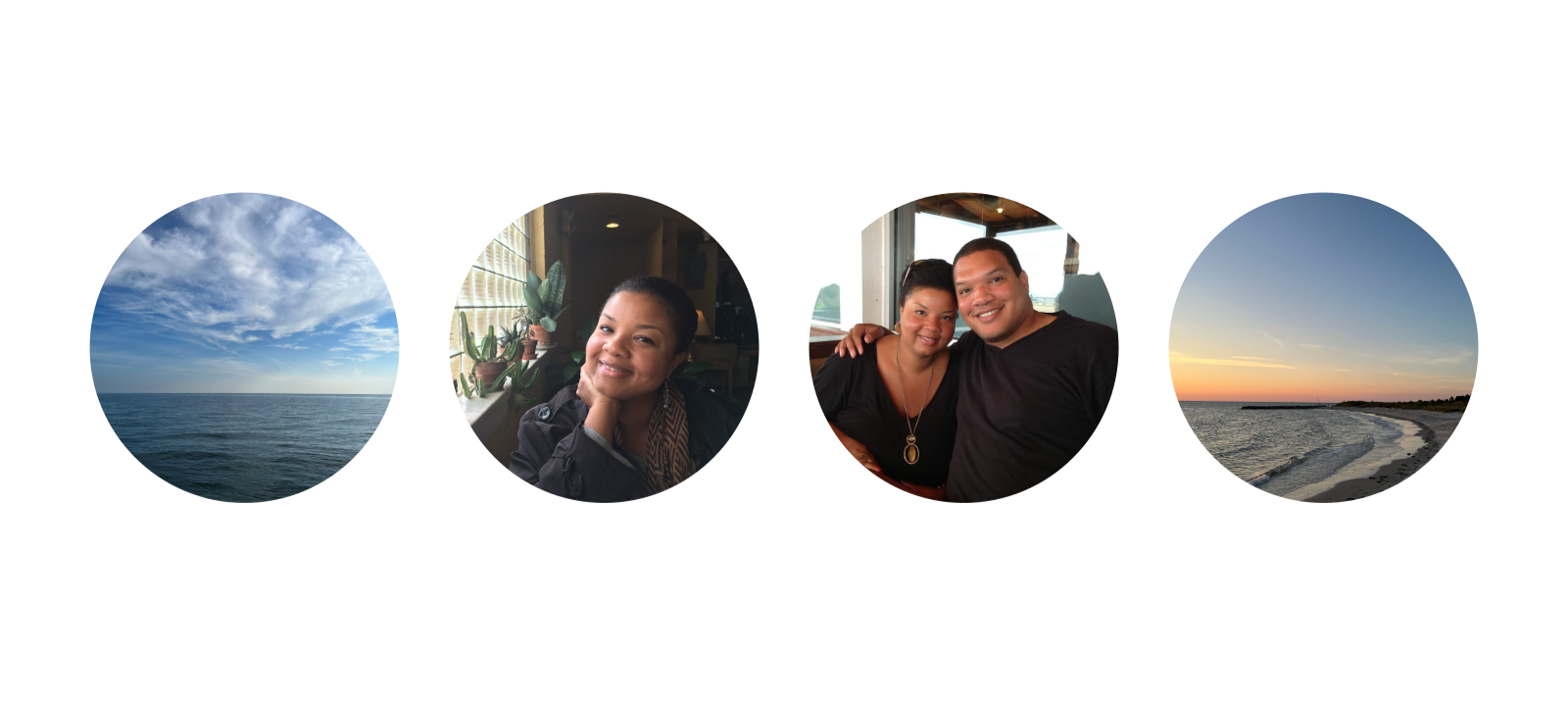Things Fell Apart and Here We Are
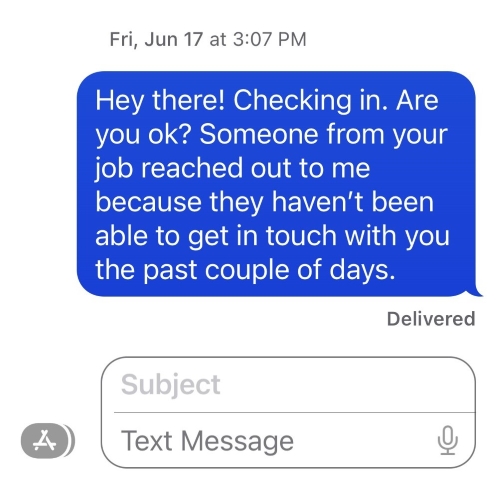
I’ve been very anxious the past week or so, and at first I couldn’t really put my finger on why.
I’m sure part of it was dealing with the estate administration process over the past few months. After the initial shock of Maya’s death subsided, it was time to focus on practical matters, like taking care of her affairs. This was an emotionally exhausting, stressful and anxiety-inducing experience for me, and I wouldn’t have asked a single other soul to do it in my place. I completed a big chunk of that process at the end of last week, so maybe the anxiety was the lead up to that. Then again, it was more than that.
After a little bit of reflection, it finally dawned on me why.
We are coming up on the one-year anniversary of Maya’s death. And this time last year – literally, this exact weekend a year ago – is what I believe triggered the beginning of the end of Maya’s time with us. It kicked off a six-week mental health spiral that that we have learned about over the past year, dealing with the emotional, spiritual and logistical aftermath of Maya’s death.
Six weeks when it all fell apart.
It started on May 7, 2022. This was “Magic Dragon Day” at St. Michael’s Episcopal School. This annual tradition represents the culmination of Spirit Week and it’s like field games and spring carnival combined into one. After a fun-filled day (well, mostly fun-filled, as our daughter did have a run-in with the slide on the playground that resulted in a lot of tears, a little blood and an early departure), we noticed the kids weren’t feeling well. Their conditions worsened rapidly and by the evening, both tested positive for Covid.
The next few days were rough. We had to cancel our plans for Mother’s Day on Sunday, May 8, 2022. This was the first Mother’s Day that my sister, Darcy (my wife), and I had not spent together since my mother passed away in May 2013, the day before Mother’s Day that year. Mother’s Day was one of our touchstones. I learned later just how much this unfortunate turn of events devastated Maya.
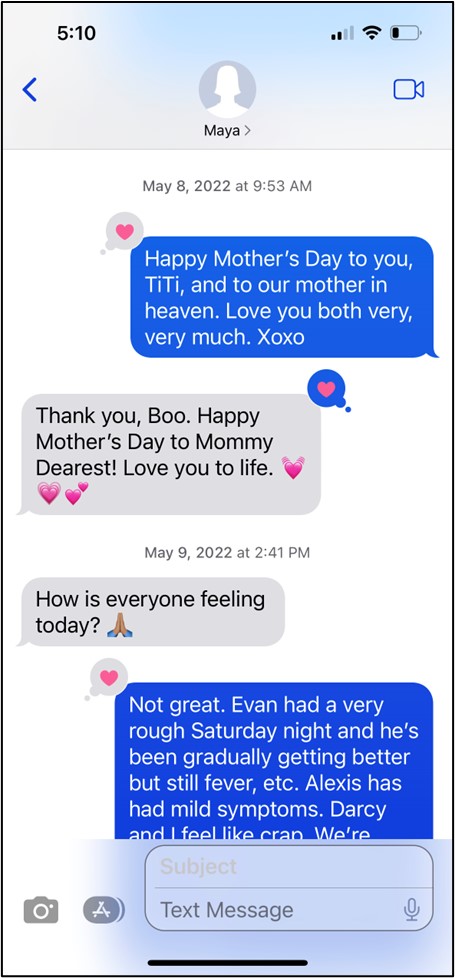
Of course, Darcy and the kids and I were already in isolation with horrible symptoms, but adding insult to injury, we both tested positive for Covid on Mother’s Day.
I texted with Maya three days later on May 11, 2022, the ninth anniversary of our mother’s death. We prayed for a peaceful day for each of us (and continued recovery for Darcy and me).
By the end of that week, we were recovering but still sick and in isolation. We had to miss my son’s Jordan’s college graduation. This was also crushing. I thought Maya was still going to go, but she texted me that day to say she wasn’t feeling well and would not be able to make it. I assumed that meant physically, and that very well might have been the case. It might also have meant she wasn’t feeling well, mentally or emotionally.
After another few days, everyone started to bounce back. And when Maya and I texted each other on May 22, she indicated she was still doing better.
And then, finally, we all reconnected on Saturday, June 11, 2022. That was my 50th Birthday. She texted me Happy Birthday and I told her I couldn’t wait to see her later that day.
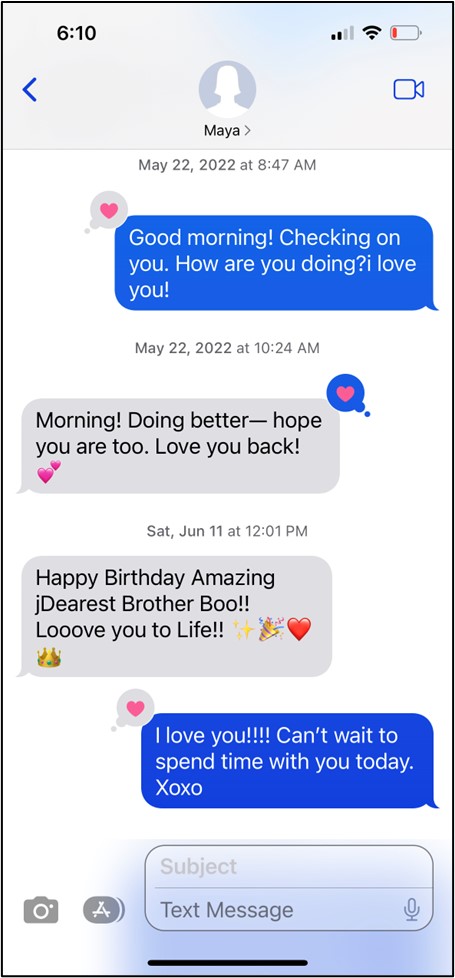
Maya came over, my oldest son Christian came home, and Jordan came over. We had a cookout. And I celebrated my 50th with my family, just the way I wanted it. I shared this list of 50 things I was grateful for. And I was blown away by the incredible gift of handwritten cards and letters that so many of my family and friends sent me from all around the country, organized by my wife.
Throughout the day, I noticed that something was off with Maya. She seemed distant and distracted the whole time. I figured she still wasn’t feeling well, physically. Then right after dinner, Maya came over to me, leaned in to hug and kiss me, and then she said she was leaving. She said goodbye to everyone and then she left. That was the last time I saw her alive, and the last time we spoke.
Six days later, we got the call that she had not been at work and wasn’t responding to calls, and her employer was worried.
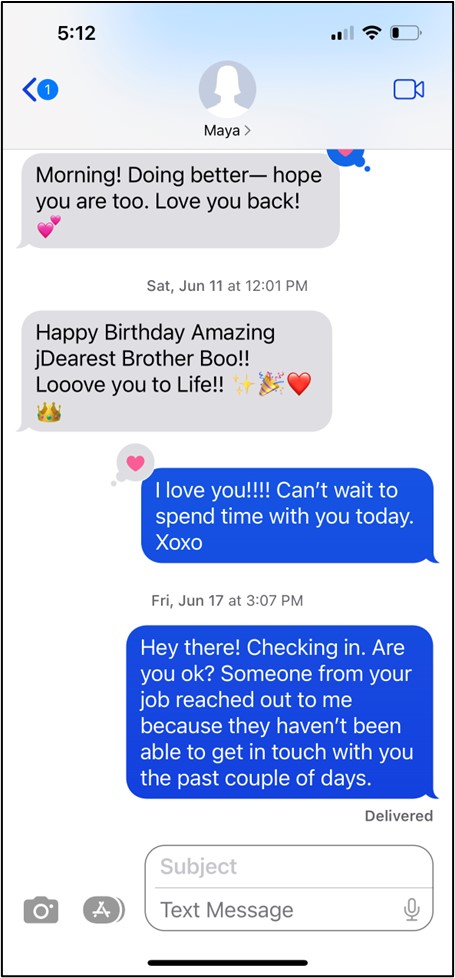
That’s when we went to her apartment and found her.
Looking back, we realized that this six-week stretch was likely triggered by not being together during Mother’s Day – an isolation of the worst kind – but had obviously been preceded by a much longer struggle. Maya was not well. Maybe she was unable tell those of us closest to her, or maybe felt ashamed due to the stigma associated with mental health challenges. Maybe she worried about what would happen to her if a serious intervention were necessary. Maybe she was already past the point of making rational decisions about her health care crisis. Maybe it was none of those things, or all of them.
We learned that during this phase, Maya was detaching from reality, and it breaks my heart to know she traveled through such a dark place without me, alone, overwhelmed and unable to see a way through or out. I still ask myself why I didn’t see how bad things were getting for her, and how quickly they spiraled to the point of no return. To the end, where everything fell apart and there would never, ever be any putting any of it back together again.
We learned that Maya actually sought medical treatment for other, seemingly unrelated, health issues during this time but she was unable to vocalize the nexus of her being unwell: her mental health challenges. Without a full picture, it’s no surprise that the caregivers she saw were unable to connect the dots. Perhaps it was already far too late at that point. We’ll never know.
What I know now is that Maya could no longer keep going without serious help, and unfortunately, for Maya, that help never came.
This is where it all fell apart. And now, here we are.
I relive all of this and reshare it with all of you for five reasons:
One. We have to check in on and with one another. There are many things that can impact our mental and emotional health and wellbeing. Many of these things can be navigated, but some require a little extra assistance. Sometimes that comes from a family member or friend or coworker who can help us put things in perspective. Sometimes it comes from reading, learning more about how to cope with everyday stressors and difficulties, and doing things that help us regulate our mental health – like exercise, meditation, connecting with nature, being with family and friends, etc. And sometimes, more professional help is necessary, like seeing a counselor, therapist or medical provider who specializes in mental health and can determine if there are deeper issues that require medical treatment.
Two. Depression and anxiety are both risk factors for suicide, according to the American Foundation for Suicide Prevention, and I believe my sister suffered from both of these. They aren’t always obvious to those of us who love and interact with people who suffer from these illnesses. But when they go undiagnosed and untreated, they can spiral – often quickly – into a place of deep despair and suffering. And often when it gets to that place, more than a “check in” is needed. By that point, it might be too late. But if we educate ourselves about the risk factors, warning signs, and protective factors, we may be able to help others get the help they need before they are in a crisis.
Three. To that point, we need to take a much more proactive approach as a society to treating mental health issues, like we do with other long-term, serious diseases like cancer, heart disease or diabetes, according to Mental Health America’s B4Stage4 Philosophy. We try to treat those diseases through things like prevention, screening, early intervention, and comprehensive treatment. We try to catch these diseases before they have progressed too far. Instead of assuming we should just “deal with it” or “get over it” – we need to learn how to really treat mental health challenges. And we need to get rid of the stigmas associated with mental health care. Far too often, mental health isn’t seen as health. But last I checked, how we think and feel in response to things happening in our own bodies, in our lives, and in the world around us, are processes that our brain plays a huge role in. And if our brain is processing those things in ways that aren’t healthy for us, that means our brain needs treatment. And that means mental health care is brain health care. And brain health care is, well, health care.
Four. The thing is, not all people experience health care the same – especially mental health care. And it’s not just about the individual. Certain population groups have less access to health care and fewer options for treatment, and even when do have the resources and opportunities to access health care, they risk having their own concerns dismissed, minimized or trivialized by a system that wasn’t designed with their experiences in mind. And when it comes to mental health, women in general and Black women in particular are among such groups. According to Dr. Erica Martin Richards of Johns Hopkins Medicine, “Women are twice as likely to experience an episode of major depression as men,” and compared to their White counterparts, Black women are half as likely to seek help.
Five. Now that you know, there are many ways you can help. You can get educated. You can volunteer your time to support the work of organizations like Mental Health America and local chapters like MHA Virginia (check out their helpful resources for Mental Health Month). You can participate in activities like AFSP Virginia’s Out of the Darkness Walks, to help prevent suicide. And you can donate to organizations like the Loveland Foundation and its innovative Therapy Fund that helps close the resource gap between mental health care and diverse racial and ethnic groups by focusing on Black women and girls.
We didn’t even know how far Maya’s mental health challenge had progressed. Until it was terminal. Until she was gone. I don’t want that to happen to your loved ones. I don’t want that to happen to you.
Check In with one another.
Recognize that mental health is health, and mental health challenges are health challenges.
Get educated about mental health – and suicide prevention in particular – so you can be a better ally and advocate.
And please take care, literally. Get the help you need. And get the help your loved ones need. If you are in a crisis, call or text 988.
I love y’all.
And I love you, Maya, to the moon and back. Forever and ever.

Resources:
https://afsp.org/risk-factors-protective-factors-and-warning-signs
https://mhanational.org/b4stage4-philosophy
https://thelovelandfoundation.org/therapy-fund/
Other Stories About Maya’s Life, Her Death, and Checking In:
Checking In: A Tribute To My Sister (Share More Stories)
Aqua Celstial: A Poem For Maya (Share More Stories)
Can We Go To The Beach? (Share More Stories)
Open The Door (Share More Stories)
OK With Not Being OK (Richmond Magazine)





